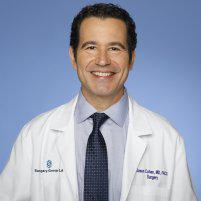Surgical Oncology Specialist

Jason S. Cohen, MD, FACS
General & Advanced Laparoscopic Surgeon located in Beverly Grove, Los Angeles, CA
Surgical Oncology Q & A
What role does surgical oncology fill in cancer care?
During cancer treatment, surgery is used to:
Diagnose cancer
Cancer is often diagnosed with a less invasive procedure, such as fine-needle aspiration. In some cases, however, a surgical biopsy is performed to remove part or all of the tumor. The tissue is then sent to the lab and examined under a microscope to determine if cancer is present.
Stage cancer
Dr. Cohen performs staging surgery to determine the size of the tumor and if it has spread. During staging surgery, he may also remove lymph nodes near cancer. The stage of your cancer guides your treatment choices.
Remove the tumor
Surgery to remove the tumor and some of the tissue surrounding the tumor, called curative surgery, may be all the treatment you need. However, you may need chemotherapy to shrink the tumor before surgery. Many patients also need chemotherapy and/or radiation therapy after surgery to ensure any remaining cancer cells are destroyed.
Reconstruct the area affected by surgery
Surgical reconstruction repairs the areas affected by removing your tumor, which may mean restoring function or your appearance. For example, women have breast reconstruction after a mastectomy.
Ease your symptoms
Palliative surgery relieves symptoms caused by a tumor when it places pressure on a nerve, pushes against an organ, or causes a blockage. You may also need palliative surgery to stop bleeding that may be caused by tumors.
Prevent cancer
If you’re at high risk for a specific type of cancer, prophylactic surgery removes that body part before cancer develops.
Can I have minimally invasive cancer surgery?
Dr. Cohen specializes in minimally invasive surgery, including robotic surgery. He uses minimally invasive procedures to perform most surgical oncology procedures. However, complete removal of your cancer is always his priority, so he talks with you about your options.
Minimally invasive surgery offers many short-term benefits, such as a lower risk of infection, less bleeding, and reduced pain. Emerging studies also show that minimally invasive surgery is the same as open surgery in terms of overall survival.
What types of cancer does a surgical oncologist treat?
Dr. Cohen offers surgical care for a range of cancers, but he specializes in the treatment and prevention of thyroid cancer, breast cancer, and cancers affecting the gastrointestinal (GI) tract. GI cancers include tumors that develop in your esophagus, gallbladder, liver, pancreas, stomach, small intestine, colon, and anus.
If you need a compassionate and experienced surgical oncologist, call the office of Jason Cohen, MD, FACS, or book an appointment online.
SERVICES

Thyroid & Parathyroid Surgery

Minimally Invasive Surgery

Surgical Oncology

Robotic Surgery

Breast Cancer Surgery

